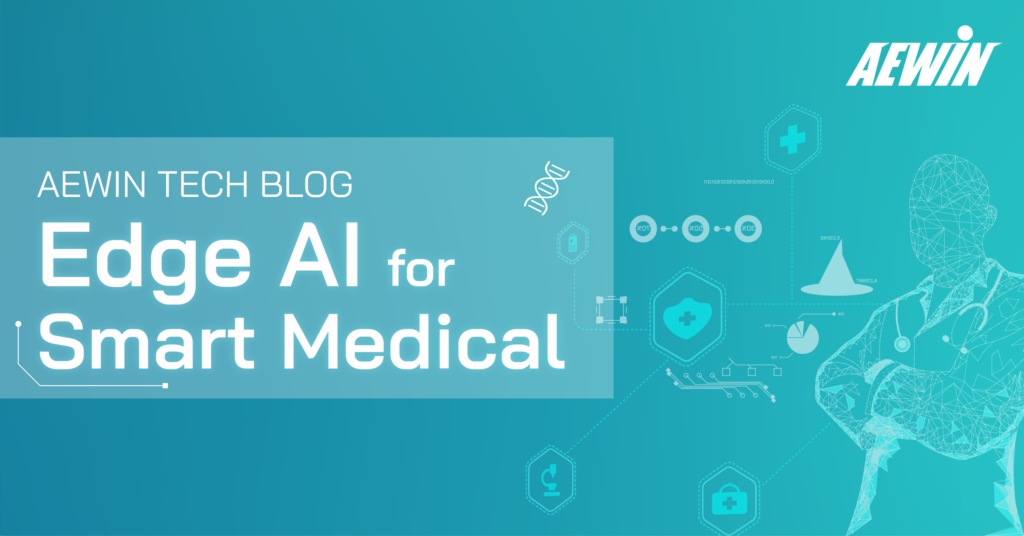
Introduction
AI has been changing our world with a vast number of new applications in manufacturing and transportation. Its power can also be leveraged to healthcare and life sciences. Together with the advantage of edge computing that massive amount of data is processed and analyzed at where it is generated and collected, Edge AI enables real-time decision-making/actions for medical clinical and research teams to embrace more possibilities.
As the pandemic has raged since 2019, the severer shortage of the medical manpower and the stronger growth pressure of the medical industry led to the evolution of smart healthcare and better medical management with automation and new technology. Let us see what Smart Medical is capable of in the fast-moving world.
Diverse Applications in Smart Medical

Remote Management
The manpower and TCO of medical system can be significantly lowered by remote management with the aids of edge AI and faster internet. As there is no need to send high-bandwidth data such as video streams across the network between cloud and premises, Edge AI improves the efficiency by processing the information at where it is generated and even integrate the collection with database in cloud for remote collaboration between patients, medical staffs, and numerous edge devices. Moreover, the security of patient health information (PHI) can be enhanced as the inference is completed at edge and the data was kept within the device to avoid attacks and data breaches.
Patient Care
Smart hospitals integrate edge computing and AI workflows with a mass of status collection not only for patient monitoring/ screening, but more intelligent uses. Edge AI in medical ecosystem can alert the medical personnel for attention and help teams make urgent emergency responses, crucial decisions, and even life-saving predictions based on the inference and real-time processing at edge. Without any delays, it performs superior compared to centralized cloud as the powerful computing is close to patients and doctors, at the point of care where exams and diagnoses take place.
Surgery Assistance
With ultra-low latency processing of edge computing, safter surgeries can be ensured. Handling data at the edge with AI and high-speed transmission of faster internet and higher throughput provides near-instantaneous insights/ feedback for tasks such as hand-eye coordination and warning where critical organs are during the procedure. As surgery assistance, Edge AI helps to avoid accident and improve surgery success rate.
Medicine Research
In addition to clinical operations, artificial intelligence also brings benefit to research of treatment of disease such as cancers and complications from COVIN-19. With advanced algorithms to process the great numbers of information sharing from global medical technology/ pharmaceutical companies and National Medical Services, new drug candidate e.g., vaccine, antivirus, etc. can be tested inside the computer against the target disease to expedite its development period and provide more efficient healing methods or even personalized medicines. Drug discovery is undergrounding the same revolution of what we have seen in other AI-impacted industries.

Conclusion
Delivering AI at the edge can minimize data privacy concerns, increase efficiency of remote management, enable real-time AI for clinical decisions, assist smart surgeries, boost the development of drugs, and more to be developed and discovered. AEWIN Edge AI servers with features of high reliability and fine design for edge deployment with the flexibility to expand per user customers’ demands are ready for the new generation of smart medical. Discovering more by contacting AEWIN friendly sales!
- SCB-1932C: 2U Edge Server with dual Intel® 3rd Gen Ice Lake-SP with 2x Gen 4 x16 FHFL GPU cards, 4x PCIe Gen4 x8 slots, redundant PSU, and short depth design.
- SCB-1937C: 2U Edge Server with dual AMD EPYCTM 7000 series with 2x Gen 4 x16 FHFL GPU cards, 4x PCIe Gen4 x8 slots, redundant PSU, and short depth design.
- BIS-3101: Desktop Workstation with Intel® 8th/9th Core i CPU, supporting Gen 3 x16 dual width GPU card.